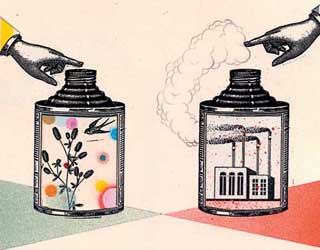
Image courtesy of Wikimedia Commons
Q: I heard stadium concerts are carbon nightmares. So do I have to skip U2 next time they’re in town?
A: In July, former Talking Heads frontman David Byrne slammed U2 for its massive 360? tour. “Those stadium shows may possibly be the most extravagant and expensive (production-wise) ever: $40 million to build the stage and, having done the math, we estimate 200 semi trucks crisscrossing Europe for the duration,” he wrote on his blog. Ouch—especially for a band that bills itself as socially responsible. An environmental consultant calculated that that the tour’s carbon emissions were equivalent to flying all 90,000 attendees at one of their London concerts to Dublin.
A tour like U2’s creates about 15 pounds of CO2 per audience member per concert, not including the carbon created by getting to the show. But few people attend more than a few truly extravagant live shows every year—most of the music we hear is recorded.
A recent study found that downloading music online creates between 40 and 80 percent fewer greenhouse gas emissions than buying a CD at a store, depending on how you get to the store and whether you burn and package your disc after you download it. In general: Assuming you drive to the music store, buying three physical CDs has 1.5 times the carbon footprint of attending a U2 show. For the same amount of carbon, you could download about 10 albums.
Tip: Don’t burn downloaded albums onto CD. If you do, you’re only creating 40 percent fewer greenhouse gas emissions than you would by buying a CD at the store. Sans physical CD, that figure jumps to 80 percent.
The bottom line: See your favorite band rock a stadium every few years—but download their albums online instead of buying a CD.
















